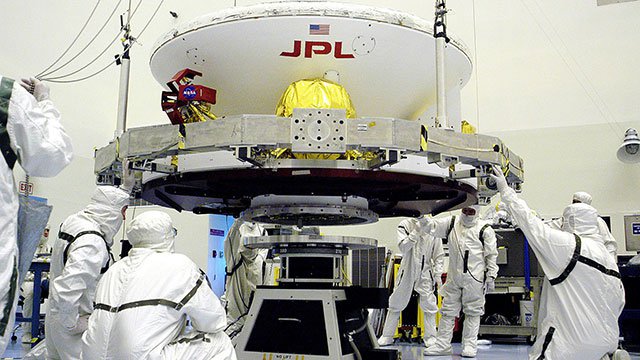
June 28, 2018
Research Highlight
How Microbes From Spacecrafts Survive Clean Rooms

In the Payload Hazardous Servicing Facility, workers prepare to lift the Mars Exploration Rover-1 (MER-B) onto a spin table during preflight processing of the spacecraft. Researchers at Cal Poly offer the first biochemical evidence explaining the reason why contamination persist after use of the cleaning facility.Image credit: NASA/JPL/KSC.
Dr. Rakesh Mogul, professor of biological chemistry at Cal Poly Pomona and a 2016 Minority Institute Research Support (MIRS) Program (now the Astrobiology Faculty Diversity Program) Fellow and his team have discovered a reason why, even after thorough cleaning, certain microbes from spacecrafts can still survive in the clean rooms at NASA.
Excerpted from the press release from Cal Poly Pomona:
The research team analyzed several Acinetobacter strains that were originally isolated from the Mars Odyssey and Phoenix spacecraft facilities. They found that under very nutrient-restricted conditions, most of the tested strains grew on and biodegraded the cleaning agents used during spacecraft assembly. The work showed that cultures grew on ethyl alcohol as a sole carbon source while displaying reasonable tolerances towards oxidative stress. This is important since oxidative stress is associated with desiccating and high radiation environments similar to Mars.
The tested strains were also able to biodegrade isopropyl alcohol and Kleenol 30, two other cleaning agents commonly used, with these products potentially serving as energy sources for the microbiome.
Read the full press release from Cal Poly Pamona.
The story has also been featured in several outlets including The Atlantic.
The research paper, Metabolism and Biodegradation of Spacecraft Cleaning Reagents by Strains of Spacecraft-Associated Acinetobacter” is published in Astrobiology.